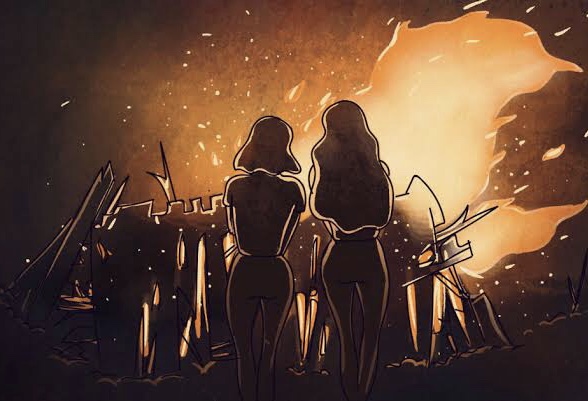
As a little girl, the concept of death was both frightening and alien. The first loss I experienced was of my grandfather (Dadu) at the age of ten, and for months I couldn’t come to terms with the fact that I won’t see him in the morning with his newspaper and chai ever again.
I remember the eerie summer morning they were taking him away for his last rites, with the men of the family carrying him, chanting God’s name. I asked my mum why she and I couldn’t join my father to say goodbye to him one last time. She answered that women aren’t allowed at the shamshanghat (cremation ground), which did not make any sense to me.
It still doesn’t.
Every time I asked this question to any grown-up, I would get a blank look with the words ‘tradition’ and ‘belief’ reluctantly thrown at me bereft of any logic.
Google proved to be more forthcoming, but just as irrational in its reasoning:
- When all the male members of the family leave for the last rites, someone has to remain in the house to clean it. And typically, this falls to the women of the household.
- As per Hindu traditions, the family members must ensure that the dead body is wholly burnt and because of the heat, the body may cramp up and appear to convulse. This is apparently a sight men alone can bear to watch.
- Unmarried women, being synonymous with ‘purity’, are vulnerable and easier for any errant evil spirits to possess.
- When a man lights his parent’s pyre, the deceased can attain “moksha” but that’s not believed in the case of daughters- they’re forbidden from lighting the pyre of their parents.
This detailed quora search ended with one conclusion: deep-rooted tyrant patriarchy disguised as religion and age-old tradition.
I think the loss of a loved one is equally painful for everyone- grief has no gender.
Besides autopsy surgeons, anyone would feel giddy when they see a dead body cramping- man, woman, or child. So the logic of women alone being too faint-hearted to witness a natural consequence of open-air cremation does not make enough sense, does it?
As far as the gender roles are concerned, this is 2020! Everyone can come back and do the cleaning; the women don’t have to stay back and do it. Virginity does not equate vulnerability, and the idea of evil spirits sounds too filmi.
It’s time to question the hollow, baseless traditions we’ve unwittingly inherited from our ancestors.
Traditionally, when a woman gets married, she has to leave her house, her family, and her surname behind. Adding insult to injury, she’s robbed of her chance to bid farewell to her parents when it’s time to light the funeral pyre- as though she has no place in this family. If someone does not have a son, the son of a close relative lights the pyre- because god forbid moksha be put at risk.
When Smriti Irani chose to be a pallbearer at a funeral, it was called an act of women empowerment. Which is great, but should it be that big of a deal?
We have so many questions to ask and so many patriarchal traditions to shatter.
Written by Kavya Cocasse for MTTN
Edited by Mihika Antonia Dean for MTTN
Featured image by Reynold Mascarenhas for www.arre.co.in
Artwork by D’Ara Nazaryan

Leave a Reply
You must be logged in to post a comment.